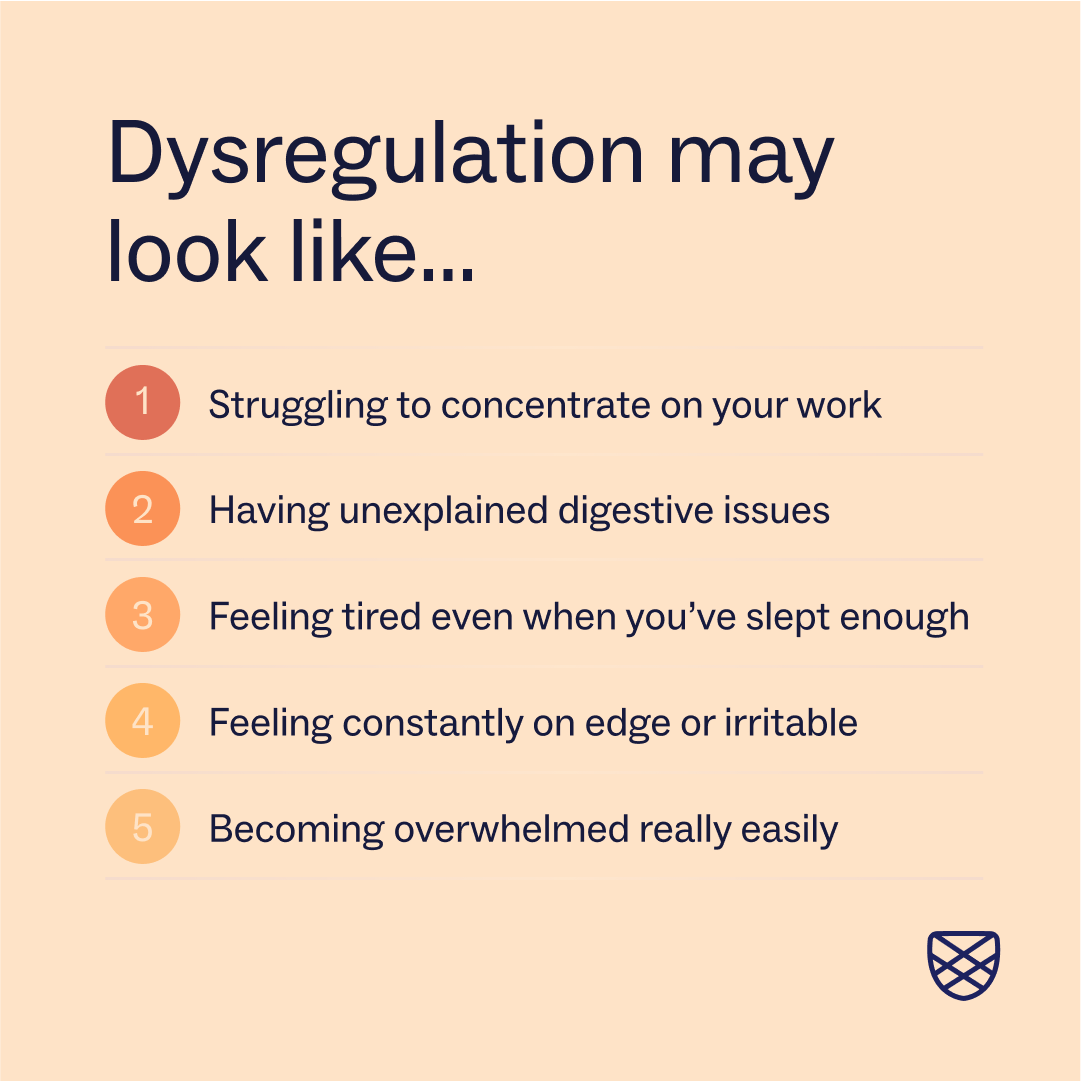
Table of Contents
Yes, a Dysregulated Nervous System Can Affect Mental Health

Written By: Alex Bachert, MPH

Clinically Reviewed By: Dr. Don Gasparini
May 8, 2024
5 min.
Learn how nervous system dysregulation can impact your body and mental health — and how to heal.
Learn more about our Clinical Review Process
Table of Contents
The human body is a complex system. It consists of 11 major organ systems which are responsible for keeping the body in good health. Each is essential, but the nervous system is the organ system responsible for communication and control in the body.
So what happens if the nervous system has trouble functioning? Below, we discuss common symptoms of nervous system dysregulation, as well as the best therapy options and lifestyle modifications to help people restore balance in their bodies.
Join the Charlie Health Library
Get mental health updates, research, insights, and resources directly to your inbox.
You can unsubscribe anytime.
What is a dysregulated nervous system?
You may remember from high school biology class that the autonomic nervous system is a network of nerves responsible for bodily functions we need to survive. It connects the brain to internal organs that allow for essential processes such as digestion, heart rate, glandular secretion (what produces sweat and saliva), and pupillary response (the pupil's response to light).
The autonomic nervous system is divided into two sections: the sympathetic nervous system and the parasympathetic nervous system. The sympathetic nervous system, sometimes called the "fight or flight" system, is best known for its role in responding to stressful or scary situations. Conversely, the parasympathetic nervous system, known as the "rest and digest" system, is responsible for helping people feel safe and relaxed by controlling breathing, lowering heart rate, and regulating digestion.
A dysregulated nervous system is defined as an imbalance between the sympathetic and parasympathetic systems. According to Charlie Health Clinical Supervisor Tracye Freeman Valentine, LPC-MHSP, a dysregulated nervous system "presents psychological, physical, or cognitive malfunctioning and imbalance which may inhibit normal functioning and the capacity to regulate responses.” In other words, when your nervous system is dysregulated, so is your normal functioning and ability to regulate responses.
What causes a dysregulated nervous system?
Nervous system dysregulation has been linked to several potential risk factors. It can be triggered by short-term conflict, such as having a disagreement with a friend, or chronic stress, such as growing up in a chaotic environment. Data shows that prolonged exposure to stress can affect the hypothalamic-pituitary axis (HPA), the body’s main stress response system, which increases cortisol levels in the body. And in time, this increases a person’s risk for mental health issues like mood disorders, anxiety disorders, and post-traumatic stress disorder (PTSD). Nervous system dysregulation is also associated with:
- A history of physical or emotional abuse
- History of trauma events or PTSD
- Burnout, exhaustion, and fatigue
- Hormonal imbalances
- Traumatic brain injury (TBI) or concussion
- Personality traits like perfectionism
Consequences of a dysregulated nervous system
“The dysregulated nervous system can cause problems with how the brain processes information and responses,” explains Valentine. When the sympathetic nervous system or parasympathetic nervous system isn't functioning properly, it can result in abnormal patterns of physiological, physical, and cognitive responses.
According to Valentine, some common consequences of dysregulation involve hyperarousal and hypoarousal. Hyperarousal refers to an increased fight or flight response, including feelings of anger, impulsivity, racing thoughts, and defensiveness. With hypoarousal, there is decreased responsiveness and a freeze or fawn behavioral response. With this state, people experience numbness, increased depressive moods, impaired cognitive processing, and shutting down. “Frequently experiencing these polar ends of moods would indicate a need for treatment and understanding of the sources of dysregulation and work towards self-regulation and mindfulness,” said Valentine.
Research shows that emotional dysregulation, sleep problems, and digestive issues are common in children and teens with a dysregulated nervous system. When left unmanaged, a dysregulated nervous system can also cause the following issues:
- Psychological symptoms: Mood swings, anxiety, stress, depression, and irritability
- Physical symptoms: Headaches, weakened immune system, chronic pain, muscle tension, and insomnia
- Cognitive symptoms: Memory problems, oversensitivity to stimuli, being easily overwhelmed, and difficulty concentrating

How can you regulate a dysregulated nervous system?
There are several strategies and mental health interventions that can help you effectively restore balance to your body and help you get to a more regulated nervous system.
1. Talk therapy
Mental health treatments such as dialectical behavior therapy (DBT) and cognitive behavioral therapy (CBT) can help regulate a dysregulated nervous system. For example, DBT teaches people about distress tolerance, emotional regulation, interpersonal effectiveness, and mindfulness. With CBT, people can “learn to manage the psychological, physiological, and cognitive aspects of dysregulation by identifying and challenging limiting schemas of personal frameworks and beliefs about self and the world,” says Valentine.
2. Vagus nerve exercises
Somatic therapy focuses on the mind-body connection and often includes exercises designed to help people release physical tension and improve overall well-being. One example is vagus nerve exercises, designed to stimulate the vagus nerve and regulate a dysregulated nervous system. Some examples of vagus nerve exercises to heal your nervous system include:
- Deep breathing exercises: Try diaphragmatic breathing, where you breathe deep into your belly and then release long exhales. If possible, exhales should be double the length of the inhales.
- Cold exposure: Whether it's a cold shower, cold plunge, or holding an icepack on your neck, cold exposure can help improve heart rate variability and increase feelings of calm.
3. Self-care
Self-care is an effective way to help your mind and body rest and replenish. Next time you find yourself feeling stressed or overwhelmed, consider taking some time to practice self-care. According to Valentine, several self-care practices can help regularize the nervous system, including aromatherapy. Aromatherapy products, whether they are diffusers or topical skincare products, can offer various healing benefits including to help you heal your nervous system. For example, lemon essential oil is said to improve mood and reduce stress, while lavender essential oil may enhance relaxation and sleep.
Also, Valentine says co-regulation — when people help each other regulate their emotions and behaviors — can help with nervous system regulation. If you're experiencing a symptom linked with dysregulation, consider reaching out to a friend or loved one for support. Co-regulation can help ensure that someone is available to offer empathy, understanding, and reassurance as you learn to regulate your emotions.
4. Healthy habits
Healthy habits are always a good way to help improve your mental and physical well-being. When it comes to managing a dysregulated nervous system, be mindful of eating a nutritious diet, getting adequate sleep, and regular physical activity. Mindfulness and meditation are other healthy lifestyle choices that can promote a regulated nervous system by helping you increase stress resilience and improve quality of life.

How Charlie Health can help
If a dysregulated nervous system is impacting your quality of life or mental health, consider seeking mental health support. Charlie Health’s virtual Intensive Outpatient Program (IOP) offers more than once-weekly therapy for young people dealing with a wide range of serious mental health conditions and concerns, including chronic stress, emotional dysregulation, anxiety, and unresolved trauma.
Our expert clinicians will create a personalized treatment plan (including individual therapy, family therapy, and supported groups) to help you build confidence, reduce stress levels, and improve your overall well-being—all from the comfort of your own home. With this kind of holistic treatment, nervous system regulation is possible. Fill out the form below or give us a call to start healing today.
References






